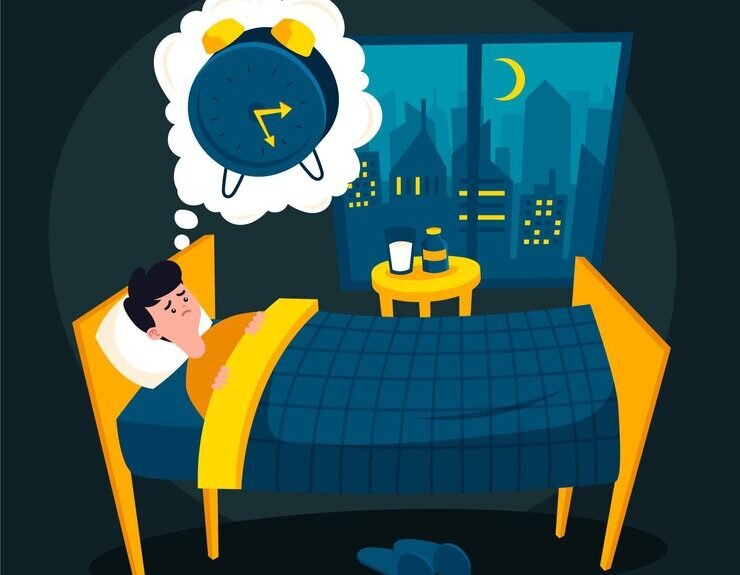The Surprising Link Between Sleep and Mental Health
Sleep is frequently neglected in the rush of modern-day life. Yet, how does sleep improve mental health? For many, this may not seem like an obvious connection, but research has increasingly shown that the quality and quantity of your sleep directly influence your mental and emotional well-being. When we sleep, our bodies aren’t just resting; they’re healing, restoring, and preparing us for the challenges of the day ahead.
While we all know the importance of getting enough sleep, many underestimate the profound effects that sleep can have on our mental state. Sleep isn’t just about getting through the day without feeling tired it’s a key player in maintaining a healthy brain, balancing emotions, and improving overall cognitive function.
In this article, we’ll explore exactly how sleep improves mental health, why quality sleep matters, and practical tips for making sleep a priority in your daily routine. By understanding the powerful connection between sleep and mental health, you’ll be better equipped to make sleep a priority in your life.
The Science Behind Sleep and Mental Health: Why Rest is Essential for Your Brain

Before we dive into the specifics of how sleep impacts mental health, it’s important to understand the basic functions of sleep. Sleep is a biological process that is crucial for the proper functioning of nearly every system in the body, including the brain. During sleep, your body undergoes various restorative processes that help regulate emotions, clear out toxins, and prepare your brain for the next day.
Sleep and Brain Function: The Connection with Mental Health
Your brain is highly active while you sleep, performing tasks that are essential for both physical and mental health. The sleep cycle includes different stages, from light sleep to deep sleep and REM (Rapid Eye Movement) sleep, each with specific functions. The deeper stages of sleep are where the magic happens. These stages help consolidate memories, support learning, and promote problem-solving.
ALSO READ: How to Be Sleepy Fast: Tips and Techniques to Fall Asleep Quicker
When you don’t get enough sleep, your brain’s ability to perform these functions is compromised, which can lead to difficulties in focusing, memory recall, and decision-making. Over time, poor sleep quality can lead to more significant cognitive issues, such as brain fog, poor concentration, and an inability to regulate emotions.
The Role of Sleep in Emotional Balance
Sleep directly influences how you process and regulate emotions. Adequate sleep helps to balance the levels of neurotransmitters (like serotonin and dopamine), which are responsible for mood regulation. When you are well-rested, you are better equipped to handle stress and negative emotions. On the other hand, sleep deprivation can lead to heightened emotional responses, irritability, and even more serious mental health conditions like depression and anxiety.
If you’ve ever noticed that you’re more irritable or anxious when you’re tired, you’ve experienced first-hand how lack of sleep can negatively affect your mental state. Sleep essentially acts as a reset button for your brain, allowing you to approach emotional challenges with a clearer, more balanced perspective.
How Does Sleep Improve Mental Health? The Key Benefits
Now that we’ve covered the basics of sleep’s impact on the brain and emotions, let’s dive deeper into the specific mental health benefits of a good night’s rest.
1. Improved Memory and Learning

One of the most significant ways that sleep improves mental health is by enhancing cognitive functions such as memory, focus, and learning. Sleep helps to consolidate memories, solidify newly acquired information, and strengthen neural connections. When you sleep, the brain works on processing everything you learned during the day, organizing it into long-term memory.
This process is particularly important for children and teens, whose brains are still developing. Lack of sleep can affect their ability to learn new things, remember important information, and perform well academically.
2. Better Emotional Regulation

As mentioned earlier, sleep plays a key role in emotional regulation. When you don’t sleep enough, your brain struggles to process and manage emotions properly, making it harder to cope with stress. Sleep helps you maintain emotional stability by regulating hormone levels, including those involved in mood control, such as serotonin and cortisol.
Without enough sleep, your body produces higher levels of cortisol (the stress hormone), which increases feelings of anxiety and irritability. Chronic sleep deprivation can lead to emotional exhaustion, mood swings, and even depression over time.
3. Enhanced Decision-Making and Problem-Solving Skills

When you’re sleep-deprived, your ability to think critically, make decisions, and solve problems becomes impaired. Sleep helps your brain make connections between ideas and store information in a way that promotes creative thinking. A well-rested mind is more alert and can approach challenges with greater clarity and resourcefulness.
Studies have shown that people who are well-rested are more likely to make better, more thoughtful decisions. Lack of sleep, on the other hand, can impair judgment, slow down reaction times, and increase the likelihood of making poor choices.
4. Reduced Risk of Mental Health Disorders

A consistent lack of sleep has been linked to a variety of mental health disorders, including depression, anxiety, and even more severe conditions like bipolar disorder and schizophrenia. Sleep deprivation impacts the brain’s ability to regulate mood and emotions, increasing the risk of developing mood disorders.
Moreover, individuals who suffer from pre-existing mental health conditions, such as depression, often experience worsened symptoms due to insufficient sleep. By improving sleep quality, individuals can reduce the severity of these symptoms and improve their overall emotional stability.
The Vicious Cycle: Mental Health Disorders and Sleep Deprivation
Sleep and mental health frequently have a cyclical relationship. Sleep deprivation can contribute to the development of mental health issues, and mental health disorders can, in turn, make it harder to get quality sleep.
Sleep Deprivation and Depression

Research has consistently shown a connection between sleep deprivation and the development of depression. People who suffer from sleep disorders like insomnia are more likely to experience depressive symptoms. Lack of sleep can also make it more difficult for individuals with depression to recover and manage their condition effectively.
One theory is that sleep deprivation affects the regulation of neurotransmitters, like serotonin, which are essential for mood regulation. When serotonin levels drop, the risk of depression increases.
Anxiety and Sleep: A Negative Feedback Loop

For individuals who struggle with anxiety, sleep problems are often a major contributing factor. Anxiety can make it difficult to fall asleep or stay asleep, and poor sleep can make anxiety worse. The cycle of poor sleep and heightened anxiety can create a feedback loop, making it more difficult to break free from either issue.
Studies have shown that people with anxiety disorders tend to experience disrupted sleep patterns, which exacerbates their anxiety symptoms. This is why addressing sleep issues is a crucial part of managing anxiety.
Tips for Better Sleep: How to Improve Your Mental Health
Now that you understand how sleep improves mental health, the next step is to explore practical strategies for improving your sleep habits. Prioritizing sleep isn’t just about lying down earlier; it involves creating a sleep-friendly environment and establishing habits that promote relaxation and restfulness.
1. Stick to a Consistent Sleep Schedule

One of the easiest ways to improve sleep quality is by sticking to a regular sleep schedule. Even on weekends, make an effort to go to bed and wake up at the same time each day. This may encourage natural sleep and wakefulness by regulating your body’s internal schedule.
2. Create a Relaxing Bedtime Routine

Your body can receive a signal to wind down when you follow a relaxing pre-sleep routine. Consider activities like reading a book, practicing meditation, or listening to calming music. Avoiding screens and stimulating activities an hour before bed can also improve your ability to fall asleep.
3. Limit Caffeine and Alcohol Intake

Both alcohol and caffeine may affect the quality of your sleep. Caffeine is a stimulant that can keep you awake, while alcohol, although it may initially make you feel drowsy, can disrupt sleep cycles. Try to avoid from using such substances in the hours before bed.
4. Optimize Your Sleep Environment

Make your bedroom a sleep-friendly space. Keep the room dark, quiet, and cool. Invest in a comfortable mattress and pillows, and try to minimize noise and light disturbances. A restful environment can significantly improve sleep quality.
5. Exercise Regularly

Regular physical activity can help you fall asleep faster and enjoy deeper, more restorative sleep. However, avoid intense exercise too close to bedtime, as it can leave you feeling too energized to relax.
6. Address Sleep Disorders

If you have persistent sleep problems, such as insomnia or sleep apnea, it’s important to seek professional help. Untreated sleep disorders can have a significant impact on your mental health and overall well-being.
Final Words: The Power of Sleep for Better Mental Health
In conclusion, sleep is not just a break from your daily activities; it is an essential component of good mental health. By understanding how sleep improves mental health, you can begin to prioritize rest and take steps toward improving your sleep habits. Whether you’re looking to enhance memory, regulate emotions, or reduce the risk of mental health disorders, sleep is a powerful tool that can help you achieve a healthier, more balanced life.
If you’re struggling with sleep, don’t hesitate to make changes in your routine and environment. Start small, stay consistent, and remember that improving sleep quality takes time. Prioritizing sleep is one of the most important things you can do for both your physical and mental well-being.
Love what you read? Join our community! Like, share, and follow Wikifomo for more exciting insights. Your support encourages our passion! Thank You.
FAQs
How does sleep affect mental health?
Sleep plays a crucial role in regulating emotions, consolidating memories, and improving cognitive function. Lack of sleep can lead to issues like anxiety, depression, and difficulty managing stress.
How much sleep do I need for optimal mental health?
Most adults need 7-9 hours of sleep each night. Sleep needs vary by age, and children and teens typically require more rest for growth and development.
Can sleep deprivation cause depression?
Yes, ongoing sleep deprivation has been linked to an increased risk of depression. Lack of sleep can disrupt neurotransmitter regulation and increase feelings of sadness, hopelessness, and fatigue.
What are the signs of poor sleep affecting my mental health?
Symptoms of poor sleep affecting mental health include irritability, trouble concentrating, mood swings, feelings of anxiety or depression, and memory problems.
How can I improve my sleep for better mental health?
You can improve your sleep by maintaining a consistent sleep schedule, creating a relaxing bedtime routine, optimizing your sleep environment, limiting caffeine and alcohol, and addressing any underlying sleep disorders.



